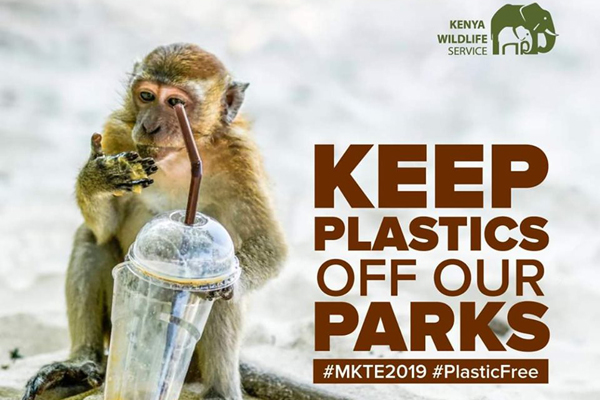
Kenya is one of over 40 countries that make plastic bags illegal, with a ban imposed in 2017. Africa has been leading the global war on plastics, and southern and eastern African countries have banned plastic bags.
The law bans the use, manufacture and importation of all single-use plastic bags. Travellers coming into Kenya with plastic shopping bags (including duty-free bags) will have to leave them at the airport. Re-usable ziplock bags continue to be allowed.
All single-use plastics have been banned from Kenya’s National Parks, conservation areas, forests and beaches since 5th June 2020. This means that visitors are prohibited from using disposable plates, cups, cutlery, straws and plastic plates.

Picture credit @kenyawildlifeservice
You cannot use plastic bags for shopping in Kenya. If you go to a shop, then take your own fabric bag or receive your goods in a paper bag. Supermarkets sell fabric bags for around 10 Kenyan shillings (approx. 10 US cents).
Tanzania, Botswana, Uganda, Rwanda and Seychelles have also banned plastic bags and Namibia has banned plastic bags from its national parks and reserves.
Rwanda instituted its plastic bag ban in 2008 and is now noticeably cleaner than other African cities with UN Habitat declaring Kigali to be Africa’s cleanest city. The lack of plastic bag litter on the streets is visible in the countryside too. Rwanda’s constitution states that “every citizen is entitled to a healthy and satisfying environment” and so the country is considering banning other types of plastic and becoming the world’s first plastic-free nation.
For your own plastic-free safari consider the following tips:
- Use an electric or stainless-steel razor
- Switch to paper or bamboo ear buds
- Unpack new items to remove plastic packaging; this may also save on luggage weight and space
- Use paper straws (or no straw) in cocktails and juices
- Use a refillable water bottle; many camps are bottling their own fresh water for guests to refill their water bottle (it’s also handy on the plane as they never give you enough water on long-haul flights to keep you hydrated – you can empty it and take it through airport security to refill on the other side)
- Carry a backpack or large bag when shopping for souvenirs
- Take an eco-friendly, biodegradable toothbrush
And if you are travelling with children:
- Carry sweets that don’t have wrappers
- Consider the more compact dried fruit rather than fresh that also has peel and cores to dispose of
- Nuts take up less space than crisps and have less packaging
- Use rechargeable batteries or take used batteries home to recycle